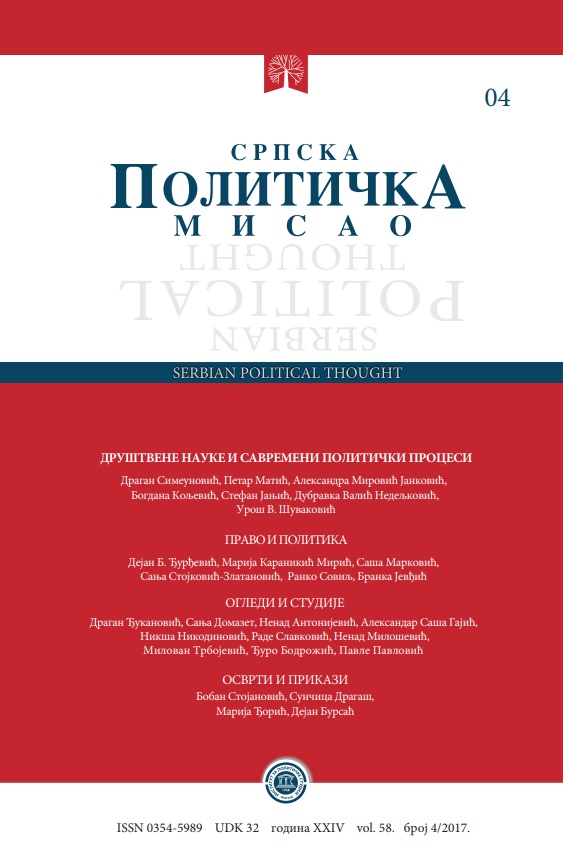Значај и улога Арктика у контексту глобалне безбедности
The Arctic Potentials as a Factor of International Security and Cause of Possible Conflicts
Author(s): Rade Slavković, Nenad MiloševićSubject(s): International relations/trade, Geopolitics
Published by: Институт за политичке студије
Keywords: Arctic; polar circle; energy; resources; waterway; influence; geostrategy; energy security
Summary/Abstract: Overpopulation of the planet, impaired ecological ballance of the environment, reduced resources, bigger and bigger demand for energy, food and water are the pressing issues of the mankind survival. The well-known changes on the planet have been caused by human species, and global warming is the most drastic of them. Entering the warming process, the planet climate has entered the knot at which the cause and consequence are constantly switching their places. Increase in temperature causes melting of permafrost. The water emerging in that way flows in abundant streams to the sea, thus reducing salinity and raising the water temperature. Consequence of this fact is additional increase in temperature, reduction of total mass of ice, increase in rainfalls, rising of sea level etc. Unstoppable acceleration of global heating is cumulative result of that. Until recently unaccessable areas have become accessible for movement and research. Permanent changes in permafrost in the Arctic have made the mankind start intensive thinking on use of the untouched reserves of ore and energy abundance of the unaccessible land and water surfaces of the planet. Apart from accessibility of new sources, melting of permafrost enabled possibility for making some new sea routes which significantly shorten distances between the world busiest harbours and consequently reduce the expenses of the goods transport. Albeit still incomplete and unsafe, new waterways have quickly become subject of disagreements among nations and the reason is the possibility of making money through charging the passage. Fact that the Arctic is the border area between two largest antagonistic countries on the planet, its strategic position is of enormous significance for defence of all the border countries. Trying to provide the best possible strategic position for themselves, either for economic or defense reasons, the nations and countries have for now been involved in conflicts on technological, diplomatic and legal fields proving their right on territory and aquatorry and, together with them, their resource. Lack of consent on the way of defining the boundaries of the Arctic Circle and the boundary lines of the continental shelves enables multiple interpretation and creates legal vacuum in which many interested parties see their opportunity to grab a piece of the cake. Territorial divisions have been agreed on in most cases. The United States of America and Russia are the biggest competitors there. On one side are US as leading country of NATO, members of which are all other countries interested in the Arctic issue; some of them have mutually unsolved territorial issues (for example, USA and Canada). Russia is on the other side and its obvious advantage can be seen through thought-out actions, legally and scientifically based arguments and demands presented in the United Nations. It is also important to emphasize that Russia, compared to its competitors, has significantly developed in terms of technology in the field of successful functioning in icy environment. This provided conditions for Russia to form military task force and renew (or build) numerous installations and bases in direct vicinity of the territory of its aspirations. Patient and legally based actions supported by latent military force threat enable Russia to strictly follow its agenda in order to achieve its interests. Having in mind the fact that smaller part of the Arctic territory has not been agreed on so far, there is common estimation that the final demarcation will be done without any armed conflict in future. On the other side, more and more frequent inflammatory rhetoric in the world against Russian actions, giving pseudo-arguments in their claims about „the right on national excellence“, military preparations and some unilateral acts of the interested parties make us conclude that an armed conflict is unavoidable. The situation is additionally complicated by assertions given either publicly or through the national strategies by the external countries interested in the issue (Great Britain, Scotland, China etc.).
Journal: Српска политичка мисао
- Issue Year: 2017
- Issue No: 4
- Page Range: 299-317
- Page Count: 19
- Language: Serbian

